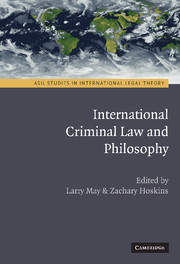Book contents
- Frontmatter
- Contents
- List of Contributors
- Introduction
- PART ONE SOVEREIGNTY AND UNIVERSAL JURISDICTION
- 1 International Crimes and Universal Jurisdiction
- 2 State Sovereignty as an Obstacle to International Criminal Law
- 3 International Criminal Courts, the Rule of Law, and the Prevention of Harm: Building Justice in Times of Injustice
- PART TWO CULTURE, GROUPS, AND CORPORATIONS
- PART THREE JUSTICE AND INTERNATIONAL CRIMINAL PROSECUTIONS
- PART FOUR PUNISHMENT AND RECONCILIATION
- Index
- References
3 - International Criminal Courts, the Rule of Law, and the Prevention of Harm: Building Justice in Times of Injustice
Published online by Cambridge University Press: 19 January 2010
- Frontmatter
- Contents
- List of Contributors
- Introduction
- PART ONE SOVEREIGNTY AND UNIVERSAL JURISDICTION
- 1 International Crimes and Universal Jurisdiction
- 2 State Sovereignty as an Obstacle to International Criminal Law
- 3 International Criminal Courts, the Rule of Law, and the Prevention of Harm: Building Justice in Times of Injustice
- PART TWO CULTURE, GROUPS, AND CORPORATIONS
- PART THREE JUSTICE AND INTERNATIONAL CRIMINAL PROSECUTIONS
- PART FOUR PUNISHMENT AND RECONCILIATION
- Index
- References
Summary
In this chapter, we argue that there is a theoretical gap in justifications for the International Criminal Court (ICC) and for other recently constituted international criminal courts, such as the International Criminal Tribunal for the former Yugoslavia (ICTY) and the International Criminal Tribunal for Rwanda (ICTR). This gap is that, on at least some accounts, these courts have been conceptualized and defended on the basis of principles of ideal justice, but they function in circumstances of grievous injustice. Recognizing this gap sheds important critical light on justifications for what we characterize as “rule of law” and “sovereignty” limits in the structure of international criminal law regimes. These limits, we contend, cast serious doubt on the ability of the ICC to achieve a preventive function as a court of law. Yet, we also argue, prevention is the function that should be paramount in circumstances of serious injustice.
On many views, justice requires that individuals accused of crimes against humanity or other serious international crimes be held accountable, regardless of the state or territory where the crime took place and the location where the accused person may be residing. At the same time, in a morally problematic world where mass violence is a recurring event, there is pressing practical need to address how such violence can be reduced. If the creation and development of an international criminal law regime provides an effective deterrent, then these goals of justice and prevention are mutually supportive.
- Type
- Chapter
- Information
- International Criminal Law and Philosophy , pp. 58 - 72Publisher: Cambridge University PressPrint publication year: 2009



